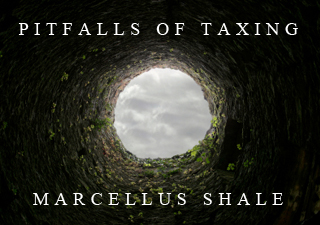Commentary

Economic Pitfalls of Taxing Marcellus Shale
The governor has taken a firm stance against taxing Marcellus gas, raising the ire of the “tax-everything” proponents and their ilk. Fortunately for the future of Pennsylvania, the governor has chosen correctly.
While to some taxing a natural resource intuitively seems the thing to do, it is a job killing economic policy. Proponents cling to it because it is their default solution for just about every revenue shortfall (the same approach that has rendered Pittsburgh a shell of its former self). Citizens who follow along with this tax and spend ideology suffer from several misunderstandings, the largest of which is that drilling companies contribute nothing to the economy.
The facts are that in Pennsylvania, Marcellus drillers contributed more than $15 billion in capital investment and have paid in excess of $5 billion in royalties to landowners not including more than $1 billion in state and local revenues. Think of every well as a nearly $5 million construction project boosting a local economy while adding revenue to neighboring municipal coffers and businesses in various ways.
In Tioga County for example, local hotel taxes hovering at $7,600 in 2008 before drilling, soared to $264,000 in 2009 and $365,000 in 2010 after drilling. Sales tax and other revenues also rose considerably. Private sector road construction in several drilling counties exceeded PennDOT’s budget for that area so local communities benefit in numerous ways.
Economically, it is folly to frighten off investors by imposing taxes that discourage investment. Marcellus is the largest of natural gas deposits, but make no mistake, it is only one of about a score of others across the U.S. with even more in Canada. Drilling for gas is an investment that without an acceptable return will not draw investors willing to place their money at risk.
Even established businesses flee when taxes become oppressive. We recently saw this in Illinois which raised its taxes 66 percent prompting one of its largest employers, Caterpillar, to threaten to take its 24,000 jobs elsewhere. Indiana and Wisconsin were quick to beckon them to their state where taxes are lower.
I wish we could entice Caterpillar to bring those jobs to our state but Pennsylvania’s Corporate Net Income tax is the 2nd highest in the U.S. We must position Pennsylvania to welcome businesses, not continue to drive them away as we’ve done for the last eight years.
One large manufacturer provides a wonderful success story. It considered moving its operation out of eastern Pennsylvania to a southern state until it realized that by taking advantage of the low cost natural gas under its own property it could not only power its factory of more than 2,000 employees but also expand its operation in PA adding another 300 jobs. That’s the economic approach we are trying to leverage for our future.
The jobs created from natural gas stretch far beyond actual drilling. A small precision instrument company in my district grew from a two-man operation to a 52-man operation all due to Marcellus shale.
Many of those employees were previously unemployed. One man’s prior skill as a TV repairman was in scarce demand but his skillset remained transferable to the electronic precision instrument field, and he now boasts a good paying job just steps away from his home. Heavy equipment operators, pipe layers, engineers, and a host of other jobs are ancillary to the industry.
Impact fees and other economic development projects targeted toward affected municipalities are far more effective than taxes in growing our economy. What you tax you get less of and instituting a tax in hopes of generating revenue for the state’s General Fund is bad policy.
First, it results in the opposite effect and second, it is foolhardy to give the Legislature any more of our money. Over the years, the Legislature has proven it squanders tax dollars on wasteful pet projects born of political gain. Our best hope is to nurture and groom this budding industry that will certainly usher in an era of prosperity for Pennsylvania unseen since the first well birthed the modern oil industry in Titusville in 1859.
This year’s budget will be balanced through spending cuts. If we follow through with business incentives, subsequent budgets will sustain themselves through an expanding economy generating solid growth buttressed by clean energy and well-paying jobs.
# # #
Representative Richard Saccone represents the 39th District covering parts of Allegheny and Washington counties.